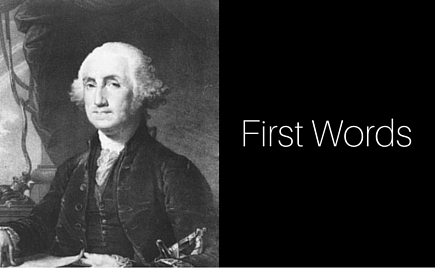First Words: George Washington, April 30, 1789

George Washington’s ascent to the presidency was really a reverse of what we have since come to expect. Rather than Washington, or his representatives, seeking the office, in 1788 citizens mounted a campaign to convince Washington to accept it. Letters poured into Mount Vernon. Many told Washington that his country needed him more than ever and that there was no justification for his refusal. While he warmed slightly to the idea, he still told a friend, "I feel very much like a man who is condemned to death does when the time of his execution draws nigh."
Washington was “condemned” to the presidency when electors from the ten participating states unanimously selected him, and his inauguration was held near New York's Wall Street in front of a tremendous crowd. Borrowing a custom from English monarchs, who by tradition address Parliament when its sessions open, Washington gave a brief speech. It was the first inaugural address and the first of many contributions that Washington would make to the office of the presidency. But this would be no monarch; the new leader wore a plain brown suit.
[T]he magnitude and difficulty of the trust to which the voice of my Country called me, being sufficient to awaken in the wisest and most experienced of her citizens, a distrustful scrutiny into his qualification, could not but overwhelm with despondence, one, who, inheriting inferior endowments from nature and unpracticed in the duties of civil administration, ought to be peculiarly conscious of his own deficiencies.
. . .
No People can be bound to acknowledge and adore the invisible hand, which conducts the Affairs of men more than the People of the United States. Every step, by which they have advanced to the character of an independent nation, seems to have been distinguished by some token of providential agency. And in the important revolution just accomplished in the system of their United Government, the tranquil deliberations and voluntary consent of so many distinct communities, from which the event has resulted, cannot be compared with the means by which most Governments have been established, without some return of pious gratitude . . .
. . .
[T]here is no truth more thoroughly established, than that there exists in the economy and course of nature, an indissoluble union between virtue and happiness, between duty and advantage, between the genuine maxims of an honest and magnanimous policy, and the solid rewards of public prosperity and felicity
. . .
When I was first honoured with a call into the Service of my Country, then on the eve of an arduous struggle for its liberties, the light in which I contemplated my duty required that I should renounce every pecuniary compensation. From this resolution I have in no instance departed. And being still under the impressions which produced it, I must decline as inapplicable to myself, any share in the personal emoluments, which may be indispensably included in a permanent provision for the Executive Department.
Find out more about George Washington.
Read Washington's entire Inaugural Address.